Clare's Law: The women who risk their lives by refusing information
- Published

Under Clare's Law, women worried about a partner can apply to be told of his criminal history
Clare's Law gives women potential access to a partner's criminal history. But the BBC has learned many women are refusing information that could save their life.
Does your partner have a violent past? Are you at risk? Clare's Law allows women - and men - to ask these questions of police, who can also use it to offer information to people who have not sought it.
Yet official figures show thousands of applications to get, or give, information result in nothing being disclosed.
According to former police officer Steve Wouldhave, this is regularly because women do not want to hear it.
They think its no-one's business but theirs and accuse police of interfering, he says.
Or, like Gemma Willis from Teesside, they already know, but think it will be different for them.
Her now ex-boyfriend had a string of convictions, including one for assaulting another woman.
But, they were "as bad as each other", with arguments stemming from drink and drugs, and she "was nothing like that", Ms Willis says.
"If I give him no reason to do anything then there was nothing that could have possibly come to me," she thought.
"But, looking at it now, it's a bit naïve."
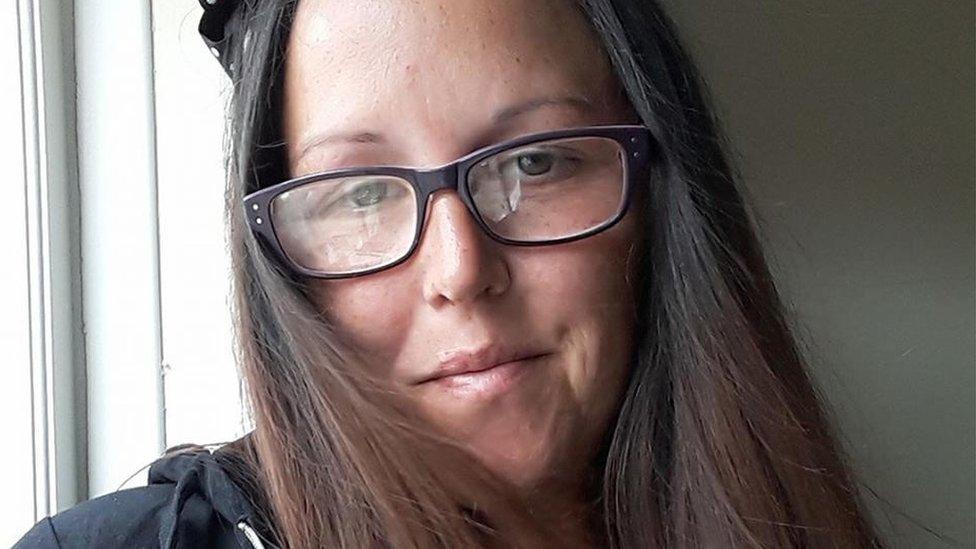
Gemma Willis thought she knew all there was to know about her former partner's past
Her boyfriend did go on to assault her.
He smashed her head into a window, slashed her neck with a trowel, punched her, hit her with hammers and threatened to kill her and her family.
Ms Willis made excuses for him, blaming his behaviour on the drugs that made him so paranoid he thought she was hiding another man in her mattress.
When his attacks came to a head and he was arrested, she expected him to admit to police what he had done.
That he didn't was the turning point. When police offered her information under Clare's Law, which she had never heard of, she accepted.
She discovered her partner had told her "nothing like" the full picture.
"My chin hit the floor," she says.
'Annoyed'
He was jailed for his abuse of her, and Ms Willis has since used Clare's Law to check her new partner - relieved both at his understanding of her need for this reassurance and at his clean record.
Officially known as the Domestic Violence Disclosure Scheme (DVDS), the law was named after 36-year-old Clare Wood, killed by a man with a history of violence in Salford, Greater Manchester.
There is a "right to ask" for partners, or friends and family. The police can use the "right to know" to consider sharing information proactively.
However, the latest available figures, external, compiled by the Office for National Statistics using force data, show less than 44% of "right to ask" applications resulted in disclosure of information (2,055 out of 4,655).
The disclosure rate for "right to know" applications is 57% (3,594 out of 6,313).
Mr Wouldhave is "annoyed to say the least" when people assume this means police are not taking potential victims seriously.

Clare Wood was killed by George Appleton, who had a history of violence against women
Figures obtained by the BBC through Freedom of Information (FOI) requests to all police forces in England and Wales suggest, in a number of cases, women are refusing to engage with police.
The police forces were asked about the reasons for non-disclosure, why information was not passed on and how many times disclosure was refused.
Of 64 "right to know" applications by Hertfordshire Police that resulted in no disclosure, the force said 63 were "mainly due to the fact that they would not engage or make contact with police, or they were already aware of the subject's previous history".
In these cases it is officers who start the process after receiving information that suggests someone might be at risk.
A couple can come to their attention in a number of ways, for example during a suspected domestic violence callout.
But, even if permission to reveal information is given, disclosure can still fail if the recipient refuses to hear it.

How Clare's Law works

Two routes: Right to ask - where a person (A) or their friend/relative (C) asks for information about a potentially abusive partner (B). Right to know - where police seek to proactively disclose
Checks are made: Who's who, what is their relationship, what risk of harm exists, what information is there to disclose?
A panel decides whether any risk is sufficient to warrant disclosure, balanced with B's legal right to confidentiality
Some forces, in urgent cases, allow an appointed officer to make the decision
B might be told or given the opportunity to object, balanced against the likelihood of this escalating the risk to A
The information is usually only disclosed to A, even if C made the application
Strict data protection rules mean it is given face to face and the recipient told he or she could face legal action by sharing it

As domestic abuse charity director Becky Rogerson points out, a visit from police can be dangerous for some women.
The chief executive officer of My Sister's Place in Middlesbrough and interim director of Wearside Women in Need says this makes it difficult for those with coercive and controlling partners to receive help.
"Even if they're not responsible for calling the police, they often get blamed," she says.
"I think a lot of women would be very worried about the police just ringing them and asking to speak about the guy that they are already frightened of."
In Ms Rogerson's experience, if a woman "feels she's not able to escape" it can be "easier not to know".
"They always think, 'if I do something, or if it gets known, then social services are going to remove my children'," she says.
"We hear that over and over and over again - women are always terrified of social services."
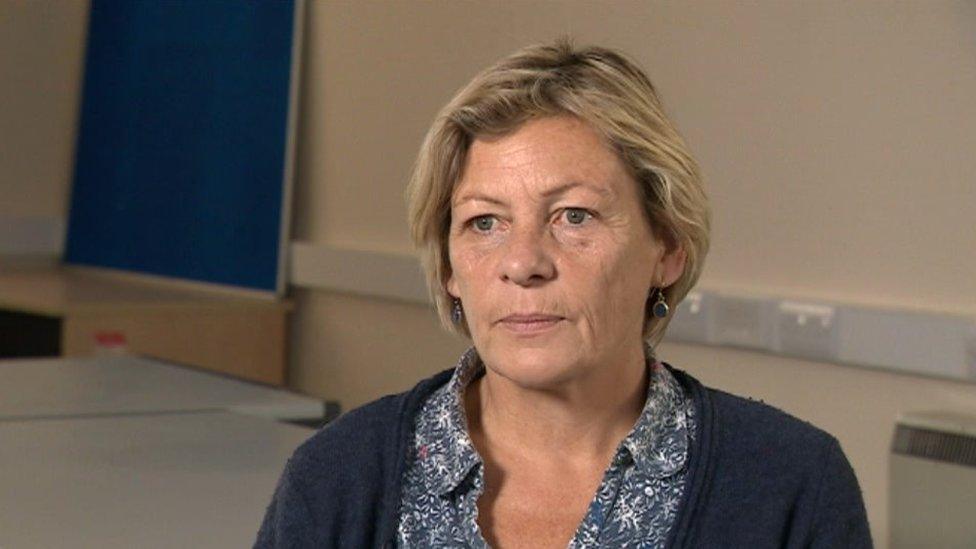
Becky Rogerson says there is a "trust issue to overcome"
They also fear reprisals if past experience makes them think the police cannot protect them.
"There's a big trust issue to overcome," Ms Rogerson says.
"The perpetrator is a greater presence and a greater threat than the police or anybody else."
Prof Sandra Walklate from the University of Liverpool, who is an expert on domestic violence, says there is "no genuine evidence" women wanted Clare's Law in the first place, and only the "assumption" it would prevent deaths.
"We have no real way of knowing whether it's working or not" without asking women whether having the information made any difference to their decision-making process, she says.
"It's certainly not working as a preventive device, which is how it was first couched."
She does not even believe it would have prevented Clare Wood's death: a study she co-wrote cited police watchdog findings that Ms Wood was already "acutely aware of her partner's violent tendencies, external, albeit towards herself rather than another partner".
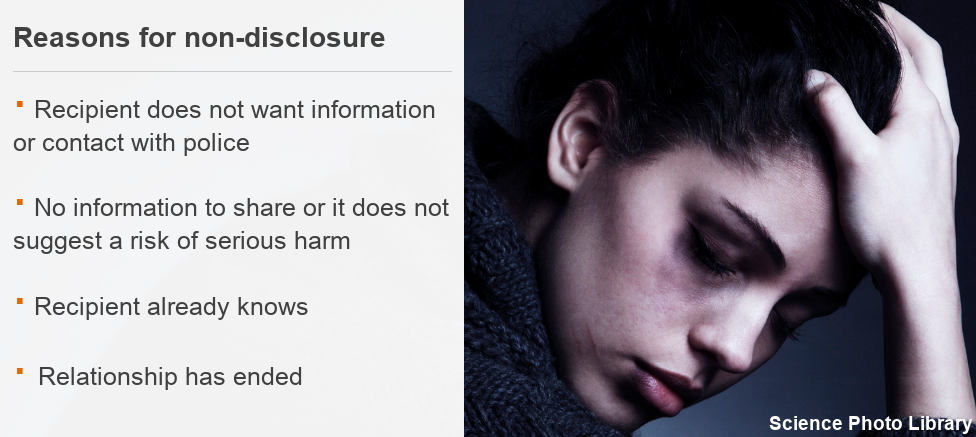
For the Warwickshire and West Mercia police forces, an unwillingness to engage with police can indicate that abuse is taking place.
Their head of vulnerability and safeguarding, Det Supt Richard Long, says knowing there has been a refusal, therefore, "could trigger interventions that might otherwise not be considered".
But many forces do not record reasons for non-disclosure, and hold data in such a way that patterns cannot be spotted.
Responses to the BBC's FOI requests reveal a large disparity in the way Clare's Law data is collected.
West Midlands Police said it could only find out why a disclosure had not been made by looking at each individual record, one by one.
It is not the only force in England and Wales in this situation.
Dyfed Powys Police admitted the way it keeps data means it would take more than a 1,000 hours to find specific details.
Michael Rowe, a professor of criminology at Northumbria University, is not surprised.
Unless a department like the Home Office requires data to be collected in a particular way, police forces are "not required to do it in a standardised format", he says.
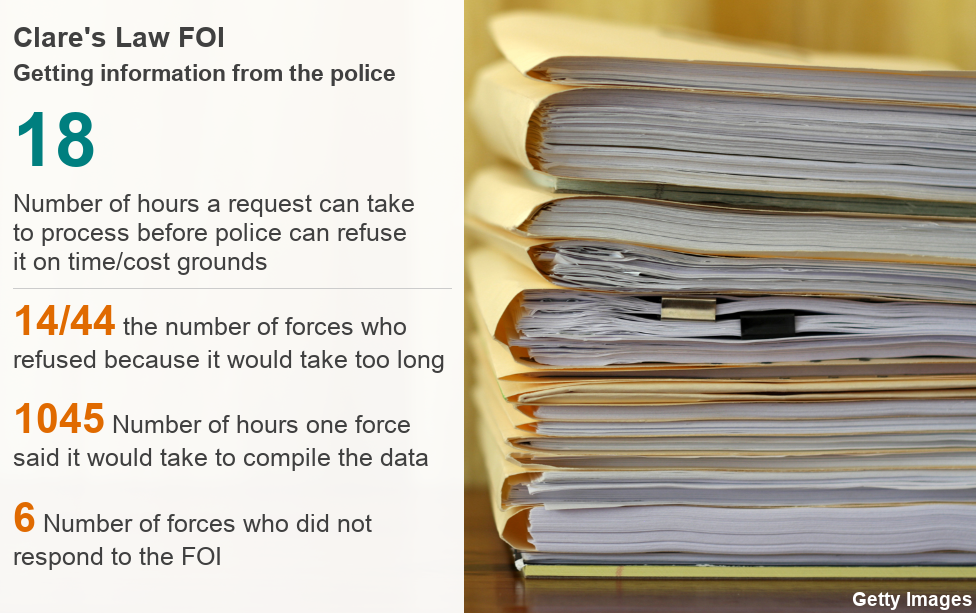
Former officer Mr Wouldhave confirms there was no national guidance on data given when Clare's Law was introduced, so "all forces will be recording differently".
The first set of official figures suggested Cumbria Constabulary had the greatest rate of disclosures in England and Wales at 96% but, by its own admission, this did not paint the whole picture.
The percentage was skewed because, in the data it sent to government, it did not include "mischief-making" applications and cases where there was nothing to disclose.
Mr Wouldhave is concerned the "ambiguity around the data" suggests one force is "better" at disclosing than another.
"It means absolutely nothing to say Northumbria only disclose 9% whilst another force may disclose 84% or whatever," he says.
"If there is any disclosure to be made, and the recipient wishes to hear it, they will be told."
For Gemma Willis, Clare's Law opened her eyes to her partner's "shocking" past, but only after she had experienced his abuse first hand.
She wishes she had known about his true nature sooner.
But, here lies the irony.
If she had known about Clare's Law, she says, she would probably have applied to see his record just to "prove to people he was OK".
- Published17 November 2017
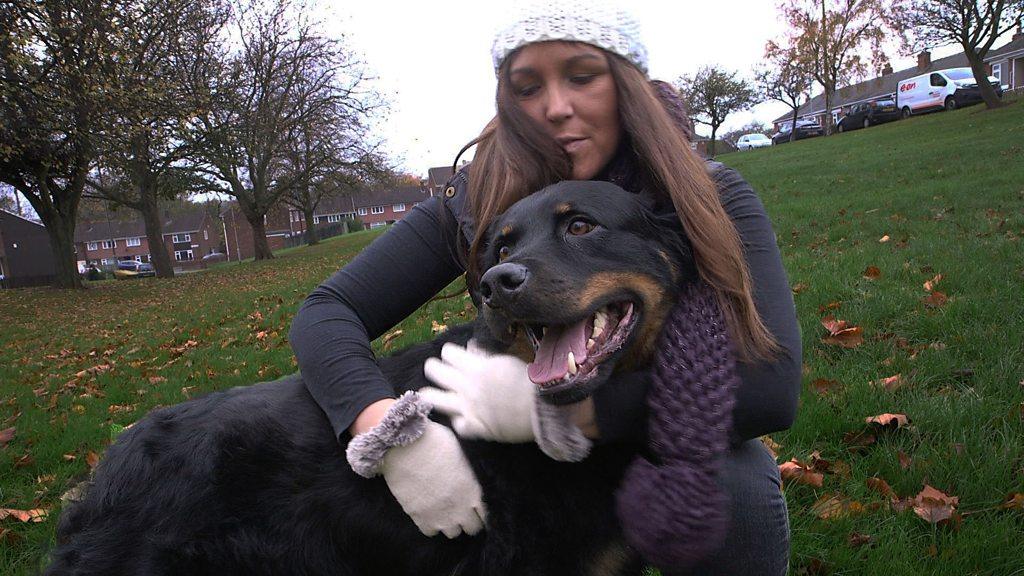
- Published1 October 2017
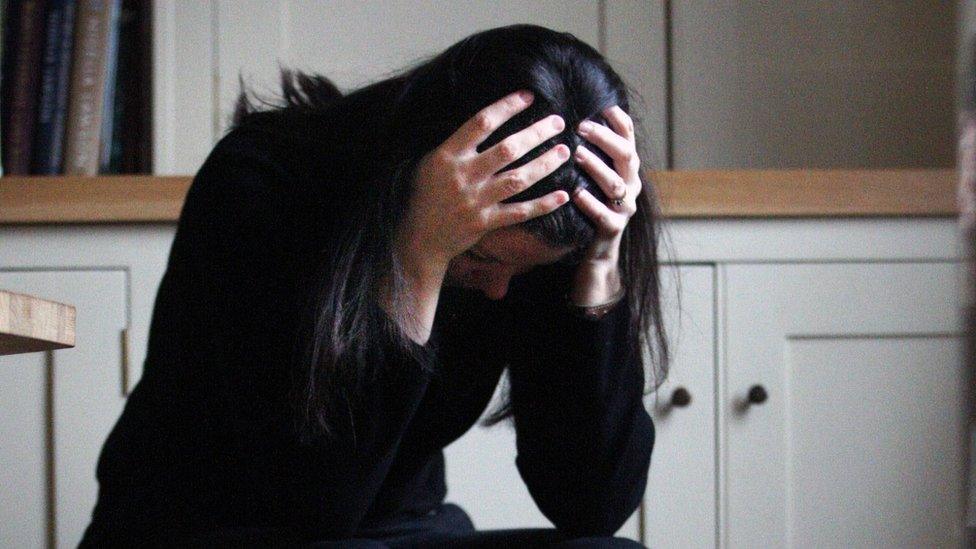
- Published26 January 2015
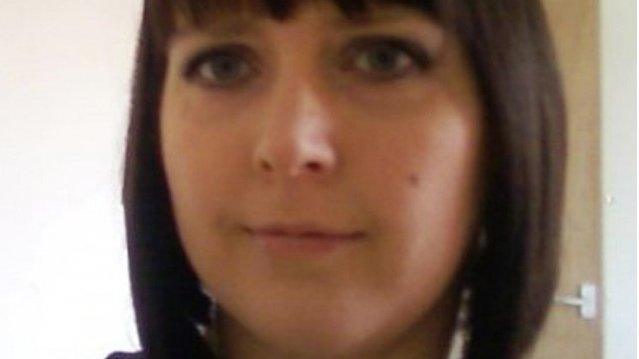
- Published8 March 2014
